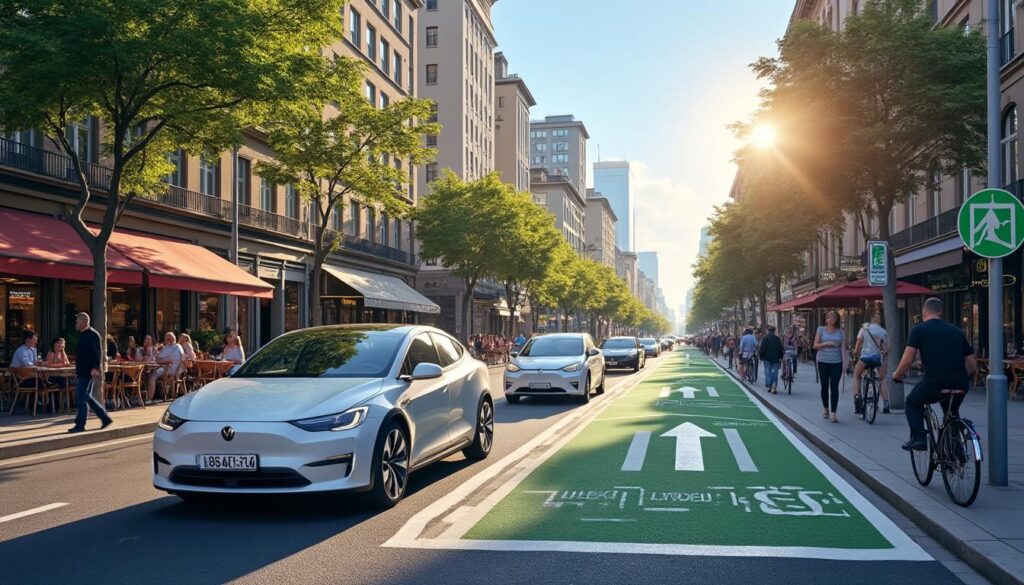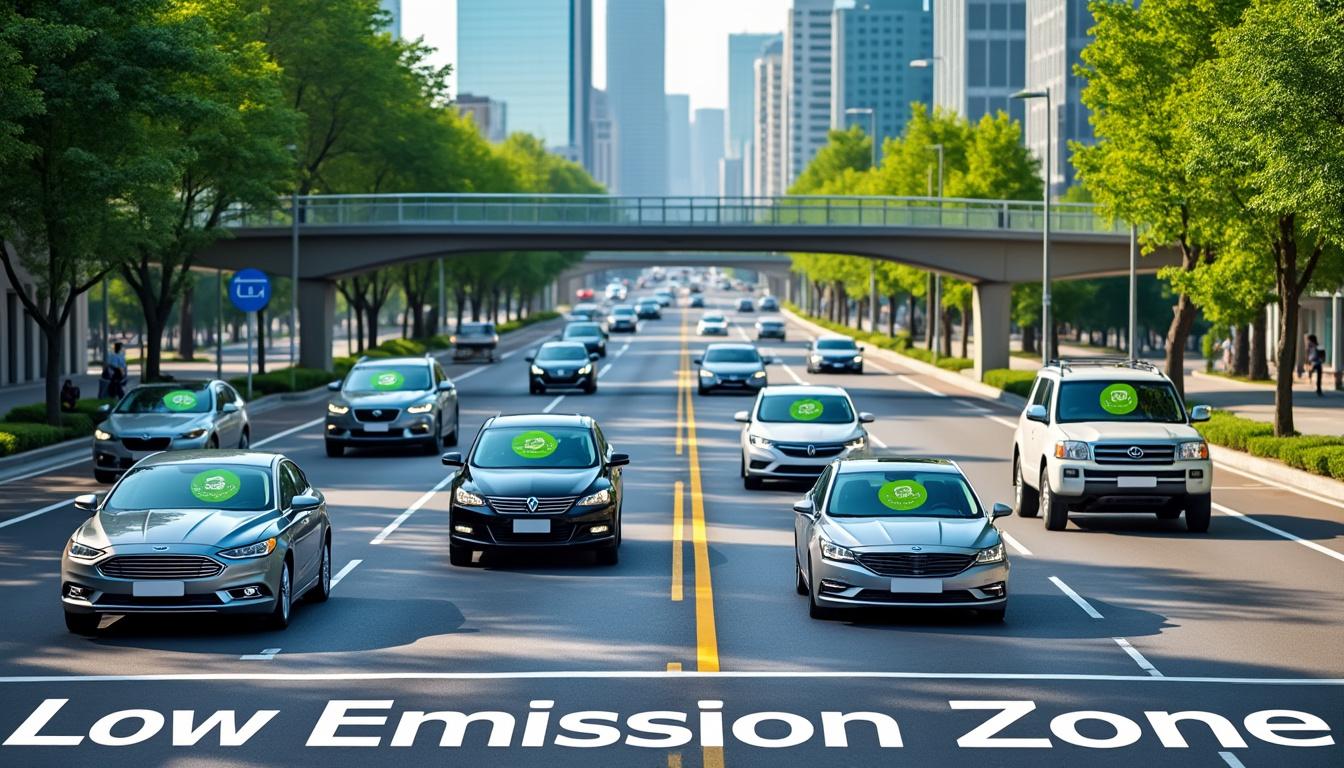Low emission areas definitively relegated to the background

The French automotive landscape is on the brink of a major upheaval. After years of heated debates and controversial measures, the National Assembly has made a decision: Low Emission Zones (LEZ) will be abolished. This vote, which took place on May 28, 2025, marks a turnaround for this environmental policy, once presented as crucial in the fight against pollution in urban areas. Motorists, as well as motorcyclists, are offered a glimmer of hope, especially since a survey reveals that the majority of the population opposes these restrictions. While some voices argue that the measure was necessary for a healthier planet, the financial and societal implications of this decision weigh heavily on the debate. What led to this reconsideration of LEZ? What impacts will this decision have on ecology and the state budget?
Low Emission Zones: a controversial initiative
Low Emission Zones (LEZ) were introduced to regulate access to cities based on the pollution levels of vehicles. In theory, the goal was to reduce the presence of the most polluting vehicles, particularly in large urban areas like Paris, Lyon, or Marseille. This aimed to improve air quality and align with European commitments regarding ecology. However, fundamentally counterproductive for a part of the population, the LEZ met with skepticism. Those who cannot afford low-cost or electric cars, such as the Nissan Leaf or the Renault Zoe, directly feel the impact of these restrictions.

Various studies have highlighted that 66.5% of the French do not have the financial means necessary to afford a vehicle that meets the standards of these zones. Car brands like Toyota, Peugeot, and Volkswagen have been called to diversify their product ranges to include more accessible options. However, this adaptation is not immediate, and many users therefore feel excluded. The introduction of LEZ has thus revealed economic fractures within French society, exacerbating tensions between urban and rural areas. Critical voices claim that these policies contribute to the stigmatization of motorists.
A revealing vote of citizens' expectations
Debates within the National Assembly have brought to light these disagreements, culminating in the vote on May 28, 2025, which led to the suspension of this measure. The deputies, required to take a stand between necessary ecology and the material concerns of citizens, saw the majority vote for the repeal of the LEZ. The vote occurred in a context where 8 out of 10 French people clearly opposed this regulation. A survey by the Drivers Defense League revealed a general climate of discontent regarding these policies.
- Arguments in favor of the abolition of LEZ:
- Exclusion of low-income motorists.
- Difficulty accessing compliant vehicles.
- Economic pressure on households.
In contrast, proponents of this initiative argued for the sake of the environment, emphasizing that air pollution is responsible for thousands of premature deaths every year. The trend towards reducing fuel consumption and sustainable environments, represented by manufacturers like Audi and Mercedes-Benz, collided with the daily realities of the French.
| French responses on LEZ | For (%) | Against (%) |
|---|---|---|
| Support of LEZ for ecological reasons | 20 | 80 |
| Proposal for a technological alternative | 35 | 65 |
The current situation raises questions about future measures to adopt in order to balance the fight against pollution and accessibility for all. Thus, the end of LEZ represents an opportunity to include more voices in this crucial conversation for the future of our cities.
The financial consequences of repealing LEZ
The decision to abolish Low Emission Zones also has considerable financial implications for the state. Adhering to regulations that incentivized the adoption of less polluting vehicles was accompanied by foreign funding, notably from the European Union. Indeed, the agreement signed in 2018 involved granting 40 billion euros to support this ecological transition. The withdrawal from LEZ could potentially lead to a shortfall of 3 billion euros for the French budget.

Economic experts emphasize that such a loss of revenue could force the state to redistribute its budget in a way that might affect other crucial investments, particularly in the public health or infrastructure sector. The possibility of reallocating funds to new initiatives to reduce air pollution will be a major issue in the coming months. A study by the Foundation for Economic Ecology even predicted that France could miss its greenhouse gas emission reduction targets, which would have consequences not only on public health but also on the country's economic competitiveness on the international stage.
Searching for alternative solutions
As France attempts to face this economic challenge, several alternative solutions are emerging. The reputation of brands like Ford and BMW for their innovation in hybrid and electric vehicles represents an opportunity to mitigate this funding loss. On one hand, local initiatives could emerge to encourage the use of soft mobility, such as bike-sharing or improved public transport.
- Potential initiatives to consider:
- Incentives for purchasing ecological vehicles.
- Support for the development of charging infrastructures.
- Education and awareness of sustainable mobility.
Some municipalities could also decide to carry out local actions to reshape the urban landscape by promoting non-polluting transport. These options require coordination between the state and local authorities, but could offer real potential for success while maintaining the commitment to the environment.
| Alternative measures | Objectives | Expected impacts |
|---|---|---|
| Financial incentives for clean vehicles | Encourage purchases | Reduction in emissions |
| Development of public transport | Facilitate access | Decrease in traffic |
With these various avenues, the government is faced with crucial choices that will determine the future of mobility in France, while attempting to address the concerns of citizens.
The reactions of different mobility stakeholders
The decision of the National Assembly has generated strong reactions among mobility stakeholders, from motorists to professionals in the industry. The abolition of LEZ is met with a mixture of relief and skepticism. For users, it is the hope of regaining free access to a public space that has gradually become restricted. Yet, for automotive manufacturers, this decision raises concerns about the supply of less polluting vehicles, and thus, the necessity to innovate further.
Brands like Renault, Citroën, or Toyota, which had already made efforts to offer ranges of electric vehicles, see their business model called into question by this regulatory evolution. As a result, the automotive sector needs to invest more in research and development if this shift towards sustainable mobility is not to be thwarted by political choices. On the other hand, the speed and motorcycle sector, often marginalized by environmental legislation, finds renewed hope. Motorcyclists, particularly those participating in events like the Technical Inspection Boycott, find popular support.
A return to the essential values of the automobile
Motorcycle enthusiasts, especially those who gathered to denounce the LEZ, also see in this repeal an opportunity to return to a more responsible culture of mobility use. These passionate individuals believe that every participant on the road has their individual responsibility. Thus, they advocate for awareness-based solutions. This return to fundamentals could stimulate the creation of a culture of sustainable transport through the promotion of responsible motorcycling activities.
- Actions recommended by motorcyclists:
- Participate in demonstrations to defend their voice.
- Encourage the use of electric motorcycles.
- Promote safe coexistence between motorcycles and other vehicles.
In this context, it would also be interesting to strengthen alternatives such as electric scooters, which could appeal to a planet-conscious audience while maintaining the allure of personal mobility. The next step will therefore reside in establishing a balance between innovation and responsible mobility.
| Opinions of mobility stakeholders | Satisfaction (%) | Concerns |
|---|---|---|
| Motorists | 85 | Accessibility |
| Automotive Industry | 50 | Necessary innovations |
| Motorcyclists | 75 | Responsible culture |
The upcoming dynamics will need to focus on constructive dialogue among all stakeholders so that the future of mobility in France is perceived as an opportunity rather than a threat. This will require genuine collaborative work so that everyone can find their place in this new road ecosystem.
The future after the end of LEZ: perspectives and issues
With the impending abolition of LEZ, France is at a true crossroads. While some see this decision as a step backward in terms of sustainability and environmental ethics, others see it as a predestined opportunity for transformation in the mobility sector. This shift is also an occasion to redefine road infrastructures, improve public transport, and promote the use of new technologies.
A more sustainable future could involve re-evaluating and modernizing public transport, key to a successful ecological transition. Initiatives, such as covering public transport costs for certain population categories, could be considered, while major brands like Ford and BMW, known for their technological advancements, could be invited to collaborate on a sustainable innovation project.
The new challenges to tackle
However, this evolution brings its share of challenges. Local authorities will need to mobilize to create favorable conditions for the implementation of alternative solutions. This includes promoting shared, pedestrian, and non-polluting transport. Public and private stakeholders will need to collaborate to rethink mobility. This could involve discussions about mandatory standards for vehicles, requiring a balance between innovation and practicality.
- Major issues to consider:
- Accessibility to transport for all.
- Infrastructures adapted to the emergence of new solutions.
- Funding for sustainable alternatives.
In summary, while LEZ were seen as necessary solutions for environmental protection, their abolition opens a Pandora's box, leaving room for constructive initiatives that could address citizens' concerns while preserving the planet.
| Actions to undertake | Objectives | Responsible parties |
|---|---|---|
| Promotion of ecological vehicles | Reduction of waste | State and local authorities |
| Improvement of urban transport infrastructures | Facilitate traffic | Local authorities and private companies |
The end of LEZ could mark the beginning of a new era, where innovation and listening to citizens will help chart a path towards a more environmentally friendly future. In this transitional context, it is crucial to gauge the expectations and needs of every mobility stakeholder while fostering positive dialogue among them.
Source: www.caradisiac.com
Leave a Reply

Articles relatifs